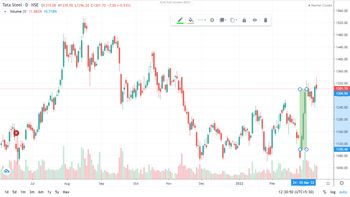Metals surge during the war
The war between Russia and Ukraine has caused a lot of destruction and loss. Nevertheless, the war has also created specific opportunities in certain sectors. One of the main sectors in India to benefit from the war is the metals and mining sector. Metals surged high when Russia waged an all-out war against Ukraine, creating a supply crisis for the metal commodities. Motilal Oswal said that Russia is the commodity powerhouse, and the situation is highly likely to positively affect the prices of steel, aluminium, nickel, thermal coal, and PCI coal.
Russia's metal exports have been stopped primarily supply to Europe was disrupted. India, the second-largest steel producer, benefits from this opportunity, mainly TATA Steel. The event was captured in the stock movements by huge buy during the war week in tata steel. The disrupted supply chain may take several months to recover, and experts suggest that the prices of metal commodities are most likely to stay on the high side.
Aluminium:
Leaving out Russian metals, the electricity costs of producing one tonne of aluminium are even greater than the price now traded in the London Metal Exchange (LME) market based on baseload spot pricing. The cost of electricity accounts for around half of the entire cost of aluminium smelting. Although the situation differs from one producer to the following, power hedges have helped producers protect themselves from the spot price and lock in some profit.
One of the industry's major issues is that if some producers do not hedge their power exposure for future use, they risk becoming increasingly exposed to spot pricing. If not in 2022, then perhaps in 2023 or later. As a result, it will not be shocking to see metal production cutbacks as long as electricity prices remain high. This might be the case for aluminium, considering how energy-intensive the smelting process is, or zinc or other base metals, depending on the producer.
Other effects:
There are also indirect effects primarily attributable to the current gas market, particularly in Europe. Greater gas prices equate to higher power costs. Higher electricity prices, combined with rising carbon prices, have resulted in the loss of 850ktpa capacity in Europe since 4Q21 (ex-Russia). The onslaught by Russia has only made things worse for European electricity prices. Meanwhile, there are concerns that train transportation or Black Sea shipping could be hampered, affecting non-Russian metal supplies from Central Asia to European markets. Even minor volume disruptions could exacerbate the problem given the already overstretched market.
